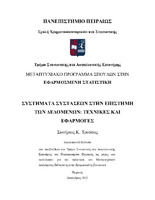| dc.contributor.advisor | Κούτρας, Μάρκος | |
| dc.contributor.author | Τρούσας, Σωτήριος | |
| dc.date.accessioned | 2023-12-20T07:18:35Z | |
| dc.date.available | 2023-12-20T07:18:35Z | |
| dc.date.issued | 2023-12 | |
| dc.identifier.uri | https://dione.lib.unipi.gr/xmlui/handle/unipi/16111 | |
| dc.identifier.uri | http://dx.doi.org/10.26267/unipi_dione/3533 | |
| dc.description.abstract | Τα Συστήματα Συστάσεων (RS) είναι εξαιρετικά δημοφιλή στη σύγχρονη εποχή. Ίσως δεν είναι υπερβολή να τα χαρακτηρίσουμε ως ένα από τα πιο ισχυρά εργαλεία της Μηχανικής Μάθησης, αφού εφαρμόζονται σήμερα σε ευρεία κλίμακα και πληθώρα τομέων. Ένας από τους χαρακτηριστικότερους τομείς είναι το ηλεκτρονικό εμπόριο, όπου τα Συστήματα Συστάσεων χρησιμοποιούνται με σκοπό να προωθήσουν και να αυξήσουν τις πωλήσεις των ηλεκτρονικών καταστημάτων. Τα Συστήματα Συστάσεων στοχεύουν στην πρόβλεψη των ενδιαφερόντων των χρηστών και στη δημιουργία προτάσεων που είναι πιθανό να επιλέξει ο χρήστης. Τα δεδομένα που απαιτούνται για τη λειτουργία ενός τέτοιου συστήματος πηγάζουν συνήθως από αναζητήσεις στις μηχανές αναζήτησης καθώς και το ιστορικό αγορών ή από άλλες πληροφορίες σχετικά με τους ίδιους τους χρήστες και τα προϊόντα που αυτοί έχουν επιλέξει στο παρελθόν. Ιστότοποι όπως το Google, το Netflix, το Spotify, η Amazon κτλ χρησιμοποιούν τέτοια δεδομένα για τη δημιουργία συστάσεων, οι οποίες δεν είναι κοινές σε όλους τους χρήστες, αλλά εξατομικευμένες, βασιζόμενες στις προτιμήσεις του κάθε χρήστη.
Στόχος αυτής της εργασίας είναι η θεωρητική περιγραφή των Συστημάτων Συστάσεων και η εφαρμογή, στη συνέχεια, της μεθοδολογίας που θα περιγραφεί σε ένα σύνολο πραγματικών δεδομένων ταινιών. Έτσι, στα πλαίσια της παρούσας διπλωματικής, αφού ολοκληρώθηκε η στατιστική ανάλυση σχετικών δεδομένων, κατασκευάστηκε ένα RS που ανήκει στην κατηγορία Content Based Recommender Systems, χρησιμοποιώντας ένα μοντέλο λογιστικής παλινδρόμησης. Στη συνέχεια, κατασκευάστηκαν δύο RSs της κατηγορίας Collaborative Filtering. Το πρώτο, με τη βοήθεια της τεχνικής Singular Value Decomposition-SVD και το δεύτερο με τη βοήθεια της τεχνικής Alternating Least Squares-ALS. Η σύγκριση και των τριών RSs έγινε με χρήση των μετρικών απόδοσης Precision, Recall και F1-Score. Το σύστημα συστάσεων με την καλύτερη απόδοση ήταν αυτό της τεχνικής Singular Value Decomposition, και ως εκ τούτου ήταν αυτό που χρησιμοποιήθηκε για να παραχθούν συστάσεις. | el |
| dc.format.extent | 84 | el |
| dc.language.iso | el | el |
| dc.publisher | Πανεπιστήμιο Πειραιώς | el |
| dc.rights | Αναφορά Δημιουργού-Μη Εμπορική Χρήση-Όχι Παράγωγα Έργα 3.0 Ελλάδα | * |
| dc.rights.uri | http://creativecommons.org/licenses/by-nc-nd/3.0/gr/ | * |
| dc.title | Συστήματα συστάσεων στην επιστήμη των δεδομένων : τεχνικές και εφαρμογές | el |
| dc.type | Master Thesis | el |
| dc.contributor.department | Σχολή Χρηματοοικονομικής και Στατιστικής. Τμήμα Στατιστικής και Ασφαλιστικής Επιστήμης | el |
| dc.description.abstractEN | Recommendation Systems are extremely popular in the modern era. It may not be an exaggeration to characterize them as one of the most powerful tools of Machine Learning, as they are applied today on a broad scale and in a plethora of domains. One of the most characteristic areas is e-commerce, where Recommendation Systems are used to promote and increase the sales of online stores. Recommendation Systems aim to predict the interests of users and create personalized recommendations based on individual’s preferences. The data required for the operation of such a system usually come from search engine queries, as well as the purchase history or other information about the users themselves and the products they have chosen in the past. Websites such as Google, Netflix, Spotify, Amazon, etc., use such data to create recommendations that are not common to all users but personalized, based on each user's preferences.
The goal of this Thesis is the theoretical description of Recommendation Systems and then the application of the aforementioned methodology on a set of real movie data. We first catty over statistical analysis of the available data and then, a Recommendation System (RS) is constructed based on the Content-Based Recommender Systems category, using a logistic regression model. Then, two RSs belonging to the Collaborative Filtering category are constructed. The first one uses the Singular Value Decomposition-SVD technique, and the second one the Alternating Least Squares-ALS technique. A comparison of the three RSs is then performed using evaluation metrics like Precision, Recall and F1-Score. The best-performing RS was the one based on Singular Value Decomposition (SVD) technique; therefore, it was exploited to generate recommendations. | el |
| dc.contributor.master | Εφαρμοσμένη Στατιστική | el |
| dc.subject.keyword | Συστήματα συστάσεων | el |
| dc.subject.keyword | Μηχανική μάθηση | el |
| dc.subject.keyword | Στατιστικές τεχνικές | el |
| dc.subject.keyword | Recommender systems | el |
| dc.date.defense | 2023-12-18 | |



